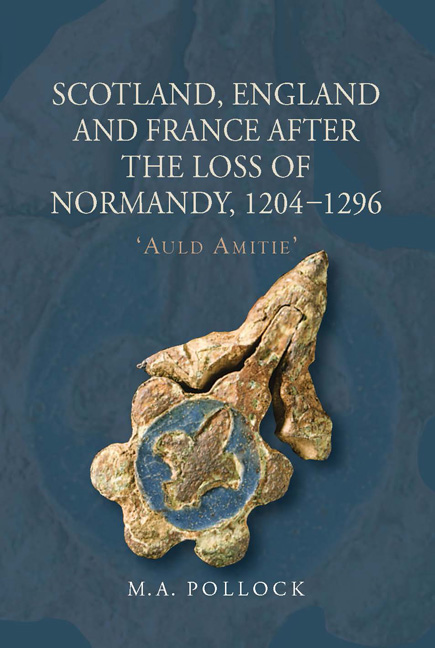Book contents
- Frontmatter
- Dedication
- Contents
- List of Genealogical Tables
- Acknowledgements
- List of Abbreviations
- Introduction
- 1 King John and Scotland after the Loss of Normandy
- 2 The Scots and the First Barons' War
- 3 Alexander and Henry III
- 4 War and Marriage: The French Dimension
- 5 The ‘Auld Alliance’: A New Beginning
- Conclusion
- Bibliography
- Index
1 - King John and Scotland after the Loss of Normandy
Published online by Cambridge University Press: 05 May 2015
- Frontmatter
- Dedication
- Contents
- List of Genealogical Tables
- Acknowledgements
- List of Abbreviations
- Introduction
- 1 King John and Scotland after the Loss of Normandy
- 2 The Scots and the First Barons' War
- 3 Alexander and Henry III
- 4 War and Marriage: The French Dimension
- 5 The ‘Auld Alliance’: A New Beginning
- Conclusion
- Bibliography
- Index
Summary
The Immediate Response to the Loss of Normandy
Reactions to King John of England's style of rule after 1204 made a deep and lasting impression on Franco-Scottish relations. Although fewer Scottish and English families continued to hold lands and serve in France after 1204, communication with French lords and the French court continued. France became a place of refuge for those who fell out with King John, particularly after he began to attack men who had previously supported him in his continental campaigns. Some of these men and their families, like Hugh de Lacy and William de Briouze, found refuge in Scotland and then fled to France where they negotiated alliances with King John's enemies. In fact, it was shortly after Briouze and the Lacys fled to France that a Franco-Welsh alliance, which had not been under discussion for almost forty years, came to the fore. There are reasons to believe, as will be argued, that Briouze, Lacy, and the Langtons, another family who found refuge in Scotland, were conduits for negotiations with the crown of France. Although these three families were not Scottish landowners, they were received and given protection by men in Scotland who were familiar with the French court.
King John was ultimately responsible for Franco-Scottish communication in this period for three reasons. First, he had failed to resolve the issue over Tynedale with the king of Scots. Second, he did not accept that he had lost Normandy permanently, and thus the war with France continued thereby encouraging the king of France to ally with those who had been alienated by John. Third, his quest to regain Normandy was overshadowed by an inherent weakness in his lordship. His magnates and lords in England, who seemingly had the most to reap from reconquest, were increasingly unwilling to commit the number of men and amount of funds necessary for the Norman campaigns to be successful.
- Type
- Chapter
- Information
- Scotland, England and France after the Loss of Normandy, 1204–1296'Auld Amitie', pp. 8 - 49Publisher: Boydell & BrewerPrint publication year: 2015

